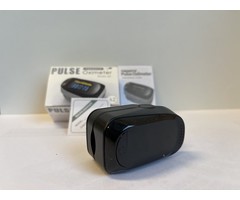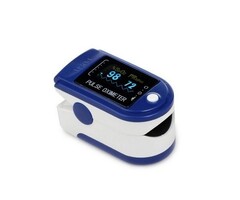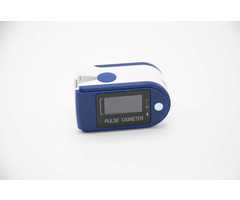Pulse oximeter
Buying a pulse oximeter online at Nobraa
Want to buy a reliable pulse oximeter? Nobraa offers high-quality oxygen meters at the best price. We do this for end consumers as well as for wholesalers. We are a leading online medical supply and distribution company. We guarantee same-day shipment. Do you have any questions about our pulse oximeter? Please feel free to contact us.
What is a pulse oximeter?
A pulse oximeter, also called an oxygen meter, is a small device that looks like a chip clip or a clothes peg. The measurement is quick and easy via the fingertip. Within seconds the oxygen meter indicates your blood oxygen level and your heart rate.
Most healthy people get an oxygen level or saturation of about 95 to 98 percent. For people with existing health problems, the normal saturation value may be lower. A doctor should be consulted if the figure drops to around 93 or 92 or lower.
Using a pulse oximeter
Do you want to buy a pulse oximeter for your own use? Then it is important to know how to use the pulse oximeter. Always read the manual of your oxygen meter carefully and make sure the batteries are in the device. This way you can be sure that the pulse oximeter is used correctly.
Before use, wash your hands thoroughly and remove any nail polish. It is also important to rest for 10 minutes before taking the measurement. First, warm your hands well and then clamp the pulse oximeter on the tip of your index finger. Then you can switch it on. The oxygen meter measures the heart rate and oxygen content of your blood. It is useful to note down values such as date, time, heart rate and oxygen saturation, so you can keep track of them.
How does a pulse oximeter work?
The oxygen level in the blood is measured utilizing a sensor in the oxygen meter. The sensor can detect different colours in red and infrared rays on the blood vessels. With oxygen-deficient blood, the blood is dark red and less light passes through it. With oxygenated blood, the blood will be lighter in colour. Thus, the pulse oximeter can use light to accurately detect the proportion of oxygen in the blood cells.
Why and when to buy and use a pulse oximeter?
Regular measurement of oxygen levels can provide insights into lung and heart function. For the body to function optimally, sufficient oxygen is needed. It can cause problems or even be dangerous when the level of oxygen in the blood is too low.
For people with lung diseases such as asthma and COPD, it is very important to monitor the oxygen level. This can be done with an oxygen meter. Based on the saturation value, medication can be adjusted if necessary.
Also for sportsmen, it is important to know what the oxygen level in their blood is. This is because the amount of oxygen can drop during heavy exertion. If the saturation level is too low, an oxygen deficiency occurs. This is dangerous. Sportsmen should keep a close eye on their saturation. Especially when they are at high altitudes. Buying a pulse oximeter can therefore be very useful for athletes.
An oxygen meter can always be handy to have around, even if it's just 'in case'. Here are the advantages for which people buy a pulse oximeter.
- A quick insight into lung and heart function
- The oxygen meter is easy to use
- Accurate and fast measurement of oxygen content/saturation
- It also measures the heart rate
- It is painless
- Durable
When should I use the pulse oximeter?
If your healthcare professional has prescribed a pulse oximeter for you and you want to buy one, ask him when he wants you to use the oxygen meter to check your blood oxygen level. Also, ask when you should change the flow rate on your supplemental oxygen and when you should seek medical help. Times when a saturation value or oxygen level may be useful are:
- When you are first prescribed oxygen. This way, your healthcare provider will know if and how your oxygen saturation level changes when you do something at home.
- During or just after exercise. Your saturation can be checked during activity to see if you have an oxygen deficiency that may not be a problem at rest. Your healthcare provider will decide with you what to do if you have oxygen problems during exercise.
- If you are flying or travelling to a place at a high altitude, your need for supplemental oxygen may increase during these periods.
Your oxygen meter measures your saturation or the percentage of blood that contains oxygen. To get the best reading from your pulse oximeter, you need to make sure that enough blood is flowing to the hand and finger that is wearing the device. The best measurement is therefore obtained when your hand is warm and relaxed and held below the level of your heart.
Can an oxygen saturation tell if I am infected with COVID-19?
We do not recommend using a pulse oximeter as a way to tell if someone has COVID-19. Get tested if you have evidence of COVID-19 or if you have been close to someone who has COVID-19.
If someone has COVID-19, an oxygen meter can help them to monitor their wellbeing. And to know if he needs clinical attention. So an oxygen meter can help someone feel that they have some control over their wellbeing. But it does not tell the whole story.
The oxygen level estimated by a pulse oximeter is not the best way to know how jaded someone is. People can feel extremely debilitated and have a great oxygen level. And others may feel well but have low oxygen levels.





